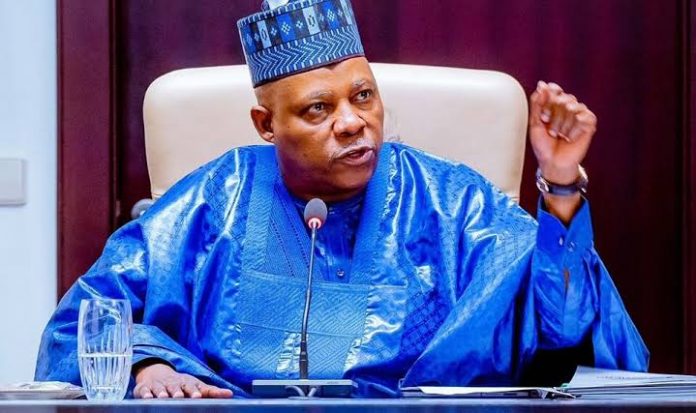The Vice President, Senator Kashim Shettima will on Tuesday April 8 and Thursday 10, 2025 perform the ground breaking work on the Kaduna and Cross River Special Agro-Industrial Processing Zones (SAPZ) project respectively. The SAPZ is a flagship initiative of the African Development Bank Group’s Feed Africa strategy.
Kaduna and Cross River States are leading the agricultural transformation, marking a pivotal shift in Nigeria’s approach to agribusiness and food security.
The Federal Government of Nigeria, in strategic partnership with the African Development Bank Group and key international partners—the Islamic Development Bank, International Fund for Agricultural Development, and Africa Grow Together Fund—will inaugurate Phase 1 Implementation of the SAPZ programme, with Kaduna and Cross River leading the other five states in the first phase which include, Imo, Kano, Oyo, Kwara and Ogun states.
The move according to the AfDB represents a bold step toward comprehensive agro-industrial development across the nation.
A statement from the AFDB says Nigeria’s Vice President , Kashim Shettima and African Development Bank President Dr. Akinwumi Adesina will lead this transformative initiative, officially launching construction in Kaduna and Cross River.
With an unprecedented investment of $538 million, SAPZ Phase 1 stands as African Development Bank’s largest programme in any African country to date.
The project, described as a timely intervention as Nigeria confronts mounting food insecurity challenges and seeks economic diversification.
The AfDB President Akinwunmi Adesina said Public-Private Partnership Model will continue to drive Sustainable Development.
“This initiative embodies President Tinubu’s commitment to boosting food security, creating sustainable employment, and revitalizing peri-urban economies through innovative public-private partnerships,” he said, adding that leading private sector partners will spearhead the design, development, and operation of the zones, establishing a blueprint for sustainable agro-industrial growth.
“The launch will catalyse momentum for SAPZ Phase 2, with 28 additional states already positioned to join this agricultural renaissance,” he noted.
Recall that the bank raised an unprecedented $2.2 billion dollars commitment at the recent Africa investment forum in Rabat, Morocco for the Nigerian Phase 2 SAPZ. Lessons learnt from this phase will lead to a faster implementation of the next phase.
The bank noted that the move will address Nigeria’s $4.9 billion annual food security challenge.
The AfDB President Akinwunmi Adesina said Public-Private Partnership Model will continue to drives Sustainable Development
This initiative embodies President He said :” Tinubu’s commitment to boosting food security, creating sustainable employment, and revitalizing peri-urban economies through innovative public-private partnerships. Leading private sector partners will spearhead the design, development, and operation of these zones, establishing a blueprint for sustainable agro-industrial growth.
“The launch will catalyse momentum for SAPZ Phase 2, with 28 additional states already positioned to join this agricultural renaissance.”
Recall that the bank raised an unprecedented $2.2 billion dollars commitment at the recent Africa investment forum in Rabat, Morocco for the Nigeria Phase 2 SAPZ. Lessons learnt from phase will lead to a faster implementation of this next phase.
He further said :” With Nigeria losing billions annually to food insecurity, the SAPZ initiative represents both a developmental priority and an economic imperative. The program aims to transform Nigeria into a global agribusiness leader by strategically leveraging co-financing and private sector expertise.
“The Special Agro-Industrial Processing Zone is about developing new economic zones across Africa close to where farmers are,” Dr. Adesina recently explained.
“These zones have enabling infrastructure—power, water, roads, irrigation—and today, we’re investing over $3 billion in more than 11 countries.He emphasised, “Transformation without agricultural transformation is incomplete because agriculture touches the lives of people at the grassroots level.
“As a Comprehensive Development Strategy, the SAPZ Nigeria Programme delivers a three-pronged approach. Infrastructure development for agro-industrial zones. Institutional capacity building and business environment enhancement as well as agricultural productivity support, skills development, and private investment facilitation across value chains
“These zones are strategically established in high agricultural potential areas, equipped with robust infrastructure and common services, and supported by tailored policy incentives to seamlessly integrate agricultural and industrial businesses.By clustering agro-processing activities within areas of high agricultural advantage, these zones bring together producers, processors, aggregators, and distributors within spheres of comparative advantage, reducing transaction costs while driving productivity and enterprise development.
“The SAPZ initiative promises to attract companies that will purchase raw materials directly from farmers for processing, creating new ecosystems of wealth in rural economies. Through value-added manufacturing, these zones will trigger long-awaited structural transformation, revitalizing rural areas, enhancing food security, improving employment opportunities, and boosting both regional and international trade.
“Additional Phase 1 outputs include comprehensive skills development for farmers and micro, small, and medium enterprises, alongside an updated agro-industrial zone policy featuring a specialized regulatory regime designed to accelerate growth.
“This landmark initiative positions Nigeria at the forefront of Africa’s agricultural revolution, offering a strategic platform to assess progress, reinforce commitments, and amplify the nation’s leadership in agricultural transformation.
“Cross River State, located in the southeastern part of Nigeria, has a diverse and vibrant agricultural sector. Agriculture plays a crucial role in the state’s economy, providing employment for a large portion of the population and contributing to food security.
“Kaduna State, located in the northern part of Nigeria, is known for its diverse agricultural activities. Agriculture plays a crucial role in the state’s economy, providing employment for a significant portion of the population and contributing to food security in the region.’


